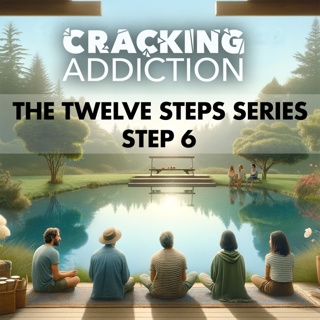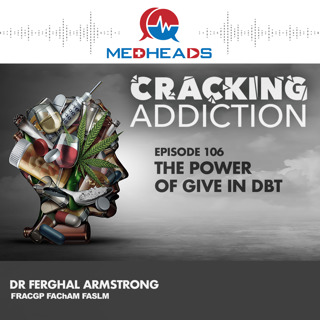
The Power of GIVE in DBT for Building Healthy Relationships
In this insightful episode of Cracking Addiction, joinDr Ferghal Armstrong and Dr. Laura Petracek as they delve into the transformative concept of GIVE from Dialectical Behaviour Therapy (DBT). GIVE, represented by the letters G-I-V-E, stands for Genuine, Showing Interest, Validating, and Using an Easy Manner. Discover how these principles can help individuals establish and maintain meaningful relationships, even amidst challenging situations.Dr. Laura explains the significance of being Genuine, a subtle yet powerful way of expressing sincere interest, especially when interacting with those who may be feeling insecure. Honesty with oneself and others fosters open and flexible conversations, leading to stronger connections.Negotiation is a key aspect of GIVE, enabling individuals to express their desires, wants, and dislikes, while seeking solutions and compromises. Learn how negotiation can maintain healthy relationships, even when differences arise, such as in matters of personal preferences or socio-political views.Additionally, Dr. Ferghal Armstrong, a renowned therapist, shares his expertise on cracking addiction, shedding light on maintaining safe and respectful environments by establishing boundaries and fostering a relaxed atmosphere.Join us for this enlightening episode and unlock the power of GIVE in building fulfilling connections with others.Discussions and comments in our videos are for informational purposes only and should not replace the advice of your medical professional. Please consult with your doctor before making any changes to your medical treatment or lifestyle.Latest Blogshttps://www.meducate.com.au/blogAbout Meducate ®Meducate provides online education for doctors, clinicians, health professionals and the public.See the website to browse the many different talks and courses available https://www.meducate.com.au
23 Aug 202311min
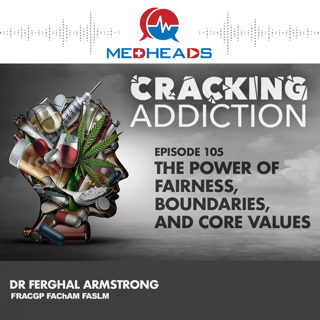
Developing Self-Respect: The Power of Fairness, Boundaries, and Core Values
Join Dr. Ferghal Armstrong and Dr. Laura Petracek in this insightful discussion on self-respect as a fundamental aspect of how we relate to others. Discover effective techniques, including the FAST approach (Be Fair to Yourself and Others, No Apologies, Stick to Values, Be Truthful), that can help you cultivate self-respect and self-esteem. Gain valuable insights into the concept of fairness and its impact on relationships, as well as the distinction between equity and equality. Explore the ongoing debate in the Supreme Court regarding admissions standards and fairness for people of color. Dr. Armstrong underscores the importance of fairness in fostering self-respect and self-esteem, while Dr. Petracek highlights the significance of boundaries and core values. Learn how aligning with your values and setting boundaries can enhance decision-making and empower you to navigate life's challenges with integrity. Don't miss this transformative discussion on developing self-respect and living authentically.Discussions and comments in our videos are for informational purposes only and should not replace the advice of your medical professional. Please consult with your doctor before making any changes to your medical treatment or lifestyle.Latest Blogshttps://www.meducate.com.au/blogAbout Meducate ®Meducate provides online education for doctors, clinicians, health professionals and the public.See the website to browse the many different talks and courses available https://www.meducate.com.au
16 Aug 202317min

Master the Art of Negotiation: Learn the O-M-A-N Framework for Effective Communication
Join Dr. Ferghal Armstrong and Dr. Laura Petracek as they delve into the transformative O-M-A-N (Observation, Measuring, Asserting, and Not) framework for negotiating with friends, partners, colleagues, and others. In this enlightening discussion, Dr. Armstrong emphasises the power of observation and creating healthy boundaries without jeopardising relationships. Discover how being a disinterested observer and practicing mindfulness can keep emotions in check during negotiations. Explore practical techniques like body scans and taking timeouts to defuse potential conflicts and facilitate open dialogue. Say goodbye to unnecessary apologies and discover the linguistic alternative, "ology," to express disagreement respectfully. Gain valuable insights into the importance of ego detachment and anacostics for problem resolution. Discover how removing ego-driven dynamics leads to more harmonious relationships and a more fulfilling life. Don't miss out on this invaluable wisdom and effective negotiating techniques for building stronger connections with those around you.Cracking Addiction 104 offers listeners invaluable insights into the art of setting boundaries, observing patterns, and understanding the role of ego in relationships. By recognizing the importance of self-reflection, assertiveness, and the impact of excessive apologizing, we can navigate conflicts with grace, preserve the dynamics of our relationships, and prioritize our well-being. Remember, true growth and freedom lie in finding a balance between asserting oneself and maintaining strong, respectful connections with others.Subscribe to Cracking Addiction for more thought-provoking discussions that explore strategies for overcoming addiction and building healthier, more fulfilling lives.
9 Aug 202324min
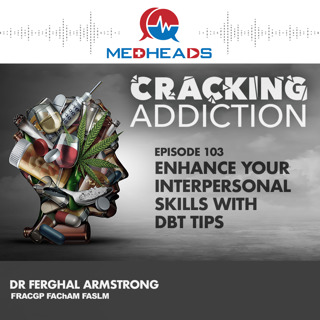
Enhance Your Interpersonal Skills with the Dear Man Technique | DBT Tips
Improve your relationships and enhance your interpersonal skills with the Dear Man technique, a powerful tool derived from dialectical behavioral therapy (DBT). Join Dr. Ferghal Armstrong and Dr. Laura Petracek as they delve into the intricacies of this technique and its application for individuals with substance use disorders and borderline personality disorder.The Dear Man technique helps you navigate challenging conversations and assert your intentions confidently. Discover how to effectively express your opinions and emotions, set appropriate boundaries, and strengthen your position in interpersonal interactions. Learn the art of saying no without fear of rejection or resentment.By employing this technique, you'll gain valuable insights into understanding the whole picture, assessing extenuating circumstances, and choosing your battles wisely. Additionally, explore the importance of scriptwriting, holistic management, emotional regulation, distress tolerance, and mindfulness as part of a comprehensive approach to personal growth.Don't miss this opportunity to develop your interpersonal effectiveness and build healthier relationships. Watch now and transform your communication skills with the Dear Man technique!Discussions and comments in our videos are for informational purposes only and should not replace the advice of your medical professional. Please consult with your doctor before making any changes to your medical treatment or lifestyle.Latest Blogshttps://www.meducate.com.au/blogAbout Meducate ®Meducate provides online education for doctors, clinicians, health professionals and the public.See the website to browse the many different talks and courses available https://www.meducate.com.au
2 Aug 202323min
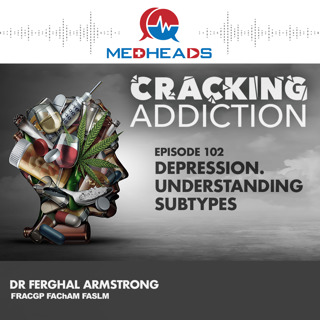
Depression: Understanding Subtypes, Diagnosis, and Effective Treatments
In this episode, we explore the diagnosis of depression and its subtypes. Depression is a powerful emotional state that affects work, relationships, and more. We delve into major depression, the symptoms, and diagnostic criteria. We discuss how depression can be a clinical disorder, not just negative thoughts. Dan Pham emphasises the importance of explaining the diagnosis to loved ones. We also examine persistent depressive disorder, adjustment disorder, and the link between depression and substance use disorders. We debunk the monoamine hypothesis and discuss the complexity of depression's causes. The show explores the compounding effects of substance use and stress. We highlight the role of antidepressants, psychological therapies, and lifestyle factors in managing depression. Join us on "Cracking Addiction" to delve into the complexities of depression and effective treatments. Subscribe now for mental health insights!
26 Juli 202322min
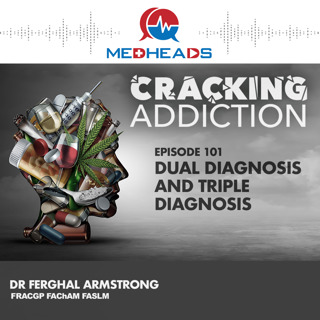
Understanding Dual Diagnosis & Triple Diagnosis in Addiction Medicine
Join us on Cracking Addiction as we delve into the fascinating world of dual diagnosis and triple diagnosis in addiction medicine. Dual diagnosis refers to the coexistence of a mental health disorder and a substance use disorder, while triple diagnosis encompasses the additional dimension of physical health. In this thought-provoking series, experts Dan Pham and Ferghal Armstrong explore the interplay between mental health, substance use, and physical well-being, shedding light on the complex relationships and effective treatment approaches. Discover the importance of holistic care, the impact of co-occurring disorders, and the need for integrated treatment in improving outcomes. Don't miss out on this enlightening journey into the intricate web of addiction and mental health. Subscribe now to Cracking Addiction and unlock the keys to comprehensive recovery.
19 Juli 202327min
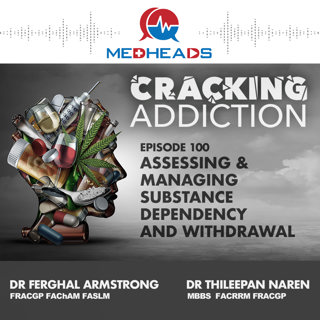
Taking Control: Assessing & Managing Substance Dependency and Withdrawal
Welcome to the 100th episode of Cracking Addiction. In this milestone episode, we delve deep into the assessment of dependency, comparing home-based detox with inpatient detox, and explore the fundamental principles of managing withdrawals for alcohol, cannabis, methamphetamine, and opioids.We examine the important decision of choosing between home-based detox and inpatient detox. We also explore the advantages and challenges of both approaches, considering factors such as the level of support, medical supervision, and individual needs.Withdrawal symptoms can be one of the most challenging aspects of addiction recovery. We tackle this topic head-on by providing a comprehensive overview of the management of withdrawals for alcohol, cannabis, methamphetamine, and opioids.
12 Juli 202336min

Unmasking the Lethality of Family Violence
Dr. Ferghal Armstrong and Steve Herd delve into the grim reality of family violence, exposing its potential for lethality. They focus on key risk factors, including the perpetrators' behaviour towards pets and their use of jealousy as a tool for control. The discussion begins by highlighting the alarming connection between the mistreatment of animals and domestic violence. Steve Herd emphasises that harm to pets serves as a significant risk factor, revealing the narcissism and psychopathy behind the abusers' actions. Animals and people become pawns in their need for dominance, erasing any notion of respect for their victims. Dr. Armstrong further elucidates how the mistreatment of pets reflects the perpetrators' hunger for control. Their narrative of blame and avoidance of responsibility sets the stage for further violence. Dr. Armstrong chillingly suggests that targeting and harming pets often precede the escalation to harming a partner, indicating the dire situation at hand. The conversation then delves into the risk factors associated with lethality in family violence. Jealousy emerges as a toxic and obsessive behaviour, capable of being misinterpreted as an expression of love. Steve Herd and Dr. Armstrong explore the concept of Othello syndrome, characterised by delusional jealousy that can lead to tragic consequences, as seen in the Shakespearean play. Sexual violence takes centre stage as another high-risk factor for lethality. Steve Herd highlights the historical context surrounding marital rape, with its criminalisation only occurring in the 1990s. Dr. Armstrong challenges outdated beliefs, expressing concern over the perception of sexual violence as a right and the role of a submissive spouse. They emphasise that sexual violence stems from a desire for dominance and control rather than any biological need. The discussion concludes by reinforcing that the risk factors discussed are not isolated incidents but rather pervasive patterns within family violence. It is stressed that family violence is a gendered behaviour, driven by choices and a hunger for power. Steve Herd and Dr. Armstrong highlight the importance of addressing these issues comprehensively to effect meaningful change. In the final moments, Steve Herd and Dr. Armstrong emphasise the need to evaluate risk levels in cases of family violence. By critically assessing the identified risk factors, they can develop effective intervention strategies to protect potential victims. Join Dr. Ferghal Armstrong and Steve Herd in this revealing episode of Cracking Addiction, where they unravel the dark truths behind family violence, unmasking its potential for lethality and offering insights into the path to intervention.
5 Juli 202315min
